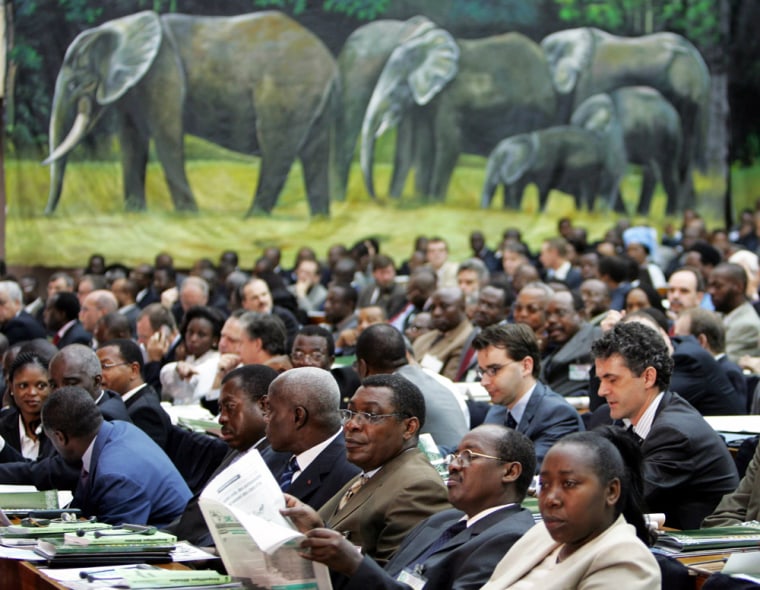Leaders of seven Central African countries have signed a landmark treaty to work together to help save the world’s second largest rain forest, but the 2004 Nobel Peace Prize winner, herself an African, warned that it's up to those governments to stop the corruption that fuels deforestation.
French President Jacques Chirac attended the ceremony, which concluded a two-day summit focusing on threats to the great forests of the Congo Basin.
The forests make up very heart of Africa, encompassing 500 million acres stretching though 10 countries. They are also home to more than half Africa’s animal species, including the world’s entire population of lowland gorillas. Nearly 20 million people depend on the forests for food and shelter.
But illegal logging, poaching, ivory trafficking and a rampant bushmeat trade are destroying the forests at alarming rate. Environmentalists say 3.7 million acres of land in the Congo Basin are lost each year.
“We are gathered here to ensure the preservation of a priceless heritage, the greatest wealth of the Congo Basin, the forest,” said Chirac, addressing Brazzaville’s parliament house, where giant colorful paintings of elephants, cheetahs and monkeys hung from the vaulted walls. “The protection of these forests cannot wait.”
Chirac was in Brazzaville Saturday as part of a brief tour of the Republic of Congo and Senegal, both former French colonies.
Sitting alongside the French president were leaders from the Republic of Congo, Gabon, Sao Tome, Equatorial Guinea, Congo, Chad and Central African Republic — which make up the bulk of the Congo Basin.
Tracking poachers, regulating logging
The treaty will make it easier for countries to jointly track and combat poachers, who easily slip across Africa’s remote borders. It will also help provide funds for training and conservation, and harmonize laws in different countries that regulate logging.
The treaty is the long-fought result of a 1999 meeting between Central African leaders in Yaounde, Cameroon.
Environmental groups attending the summit hailed the treaty as a triumphant victory.
“You’re finally seeing a commonality in what people are saying that was unthinkable 10 years ago,” said Claude Martin, head of the World Wildlife Fund. “The leaders here are seeing how the exploitation of their forests will not contribute to their economies, poverty reduction and future prospects.”
Kenya’s deputy environment minister, Wangari Maathai, winner of the 2004 Nobel Peace Prize, accepted an invitation from the leaders to become a roving ambassador for the Congo Basin even though her country is not part of the region.
But Maathai, who won the Nobel prize after leading a massive tree-planting program and campaigning against corruption, also noted several speakers at the conference in the capital of Congo Republic had stressed the need for good governance.
“It is not by coincidence. Rather, it is because it is a serious issue and we must address it,” she said on Saturday.
“We have many friends,” she said. “They want to help us. But we must create an enabling environment for development partners to do their part.”
Corruption concerns
All of the countries concerned are regularly ranked among the world’s most corrupt.
Local and international watchdogs says there is clear evidence of large-scale illegal logging and officials embezzling or squandering much of the money timber companies pay to the state to help local communities.
“It’s scandalous how little of that money that is generated trickles down to local people,” said Filip Verbelen, a Greenpeace campaigner.
Verbelen said the Congo Basin countries first committed themselves to preserving the forests at a summit six years ago but illegal and irresponsible logging remained widespread.
“On paper, yes, they have the right language,” he said. “But I have no indication at all that there is a political will to implement these measures fast.”
Verbelen added, however, that regional states and Western nations were at least now talking openly of illegal logging as a major problem when they had previously shown little interest.
The campaigners’ next challenge is to try to create a similar change in attitude when it comes to corruption.
“To paraphrase the words of President Kennedy, let us not ask what we can get from the Congo Basin. Rather, what we can do for the Congo Basin,” Maathai told the summit. “The basin does not need us, we need it.”
